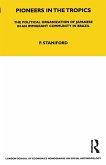In Good Government in the Tropics, Judith Tendler questions widely prevailing views about why governments so often perform poorly and about what causes them to improve. Drawing on a set of four cases involving public bureaucracies at work under the direction of an innovative state government in Brazil, the book offers findings of significance to the current debates about organization of the public-sector workplace, public service delivery, decentralization, and the interaction between government and civil society. The case chapters represent four different sectors, each traditionally spoken for by its distinct experts, literatures, and public agnecies -- rural preventive health, small enterprise development, agricultural extension for small farmers, and employment-creating public works construction and drought relief. With findings that cut across these sectoral boundaries, the book raises questions about the policy advice proferred by the international donor community. It shifts the terms of the prevailing debate away from mistrust of government toward an understanding of the circumstances under which public servants become truly committed to their work and public service improves dramatically. "The traditional focus on trying to eliminate 'rent-seeking' by reducing the state's role has made a contribution but lost much of its charisma. Theoreticians and practitioners alike are looking for new ideas and Tendler offers a quite intriguing set of them. The cases demonstrate surprising counter-intuitive results that will be of interest even to those with little substantive interest in the particular setting described. Theoretical novelty and elegant use of evidence combine to makethis book a clear winner." -- Peter Evans, University of California at Berkeley
Hinweis: Dieser Artikel kann nur an eine deutsche Lieferadresse ausgeliefert werden.
Hinweis: Dieser Artikel kann nur an eine deutsche Lieferadresse ausgeliefert werden.








